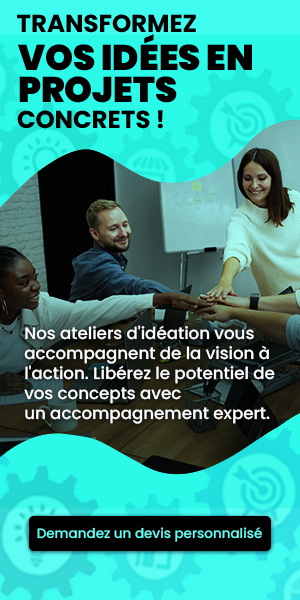Embark on a captivating journey into the world of role-playing, a method that unlocks the hidden innovator within each of us. Through immersive scenarios and dynamic interactions, this approach invites exploration of creative ideas and embodiment of diverse perspectives. By stimulating creativity and collaboration, role-playing becomes a gateway to innovative solutions and bold concepts. Allow yourself to be carried away by this playful experience that transforms conventional thinking into a rich collective adventure.
🔥 Nous recommandons Ideamap
Ideamap est l’outil idéal pour un brainstorming ou un projet collaboratif. Grâce son interface facile et à ses fonctions IA, Ideamap booste votre créativité tout en favorisant une meilleure organisation de vos idées pour atteindre vos objectifs.

The role-playing game is a playful practice that allows participants to embody characters within fictional scenarios, thus creating a unique immersive experience. This type of game provides a framework where imagination and creativity can flourish while fostering exchange and collaboration among players. In this context, role-playing proves to be not only a tool for entertainment but also a genuine catalyst for innovation and personal development.
At the heart of role-playing is the opportunity to explore various scenarios, challenges, and social interactions. By taking the form of fictional characters, players can experience situations they may never have encountered in their real lives. This immersion allows them to broaden their perspective and develop their sense of empathy, important skills in an interconnected and ever-evolving world.
Role-playing also stimulates creativity. By playing characters and facing unprecedented situations, players are invited to create innovative solutions to complex problems. Each participant has the freedom to imagine, invent, and take risks in an environment conducive to experimentation. This encourages not only critical thinking but also the capacity to break away from habitual thought patterns, essential for successful innovation.
In terms of professional development, the role-playing approach is increasingly integrated into the business and training world. Companies use this method to foster collaboration and enhance communication skills. For example, during creativity workshops, participants can step into the shoes of clients or competitors, allowing them to gain deeper insight into the needs and expectations of others. This immersion strengthens their ability to design products and services that truly meet market demands.
Apart from the benefits in terms of innovation, role-playing also offers psychological advantages. By releasing tension and inhibitions, it allows participants to better manage their emotions and improve their interpersonal skills. By creating a safe space to explore different facets of their personality, players become aware of their strengths and weaknesses, which helps them to develop greater self-confidence.
Role-playing further fosters learning through hands-on experiences. Participants learn by doing, implementing theories and concepts in a playful setting. Role-playing sessions can thus yield tangible results, not only in creative development but also in the application of new ideas within their organization. The lessons drawn from role-playing can be directly integrated into design thinking and ideation processes, thereby enhancing a team’s innovative capacity.
In summary, role-playing is a powerful method that liberates the innovator that lies within each of us. By encouraging imagination, collaboration, and experimentation, this practice paves the way for overflowing creativity while promoting a better understanding of human interactions and customer needs. By integrating role-playing into educational and professional environments, we can cultivate a culture of innovation that propels our ideas into new horizons.

“`html
FAQ – Role-playing: the innovator within you
A : Role-playing in the context of innovation involves embodying different characters or situations to explore new ideas and perspectives. This allows for simulation of real situations and testing of innovative concepts in a playful manner.
A : By allowing participants to step out of their comfort zone and experiment with new approaches, role-playing stimulates creativity. Metaphors and imaginary situations help generate original ideas and consider innovative solutions.
A : Teamwork is strengthened through defined roles and a shared understanding of challenges. Participants learn to collaborate effectively and gain a better understanding of others’ perspectives, fostering an atmosphere of engagement and co-creation.
A : Absolutely! These games are accessible to everyone, regardless of experience level. They are designed to encourage participation from all and leverage the collective intelligence of the group.
A : Role-playing helps develop communication, empathy, problem-solving, and project management skills. These skills are essential for success in an innovative and collaborative environment.














